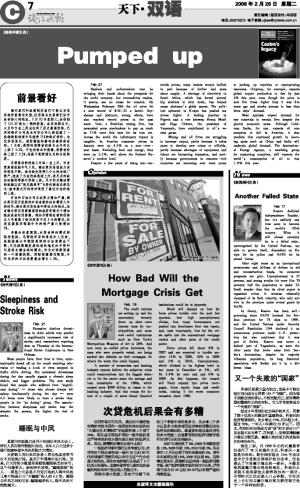Feb 17
Kosovo declared independence Sunday, but it's unlikely any time soon to become the world's 193rd country. What it will almost certainly be is a failed state, unrecognized by the United Nations, unable to govern itself, dependent on Europe for its police and NATO for its armed forces.
After eight years as an international protectorate and billions of dollars in aid and reconstruction funds, its economic prospects are grim. Unemployment is 57 percent, and among youths it's more like 70 percent; half the population is under 25. Small wonder then that its chief export is organized crime. It remains ethnically cleansed of its Serb minority, who only survive in the province under armed guard by NATO.
In theory, Kosovo has been self-governing since NATO bombed the Serbian province for 78 days in 1999, and the United Nations under Security Council Resolution 1244 declared it an autonomous province under U.N. protection but also confirmed that it was part of Serbia. Kosovo was never a federal part of Yugoslavia, as were the other parts that broke away from Serbia's domination; despite its majority Albanian population, its long historical association with Serbia put it in a different class.
又一个失败的“国家”
科索沃星期天宣布独立,但是不可能在短时间内成为世界第193个“国家”。因为得不到联合国的承认,不能支配自己,要依靠欧盟的警察和北约的军队,它几乎肯定将成为一个失败的“国家”。
经过8年受国际社会保护的岁月,花费了数十亿美元的援助和重建资金,科索沃的经济前景堪忧。失业率达57%,在年轻人中,超过70%;一半人口年龄在25岁以下。因此,有组织的犯罪成为该“国”的主要出口产品也就不足为奇了。在种族上,依然要清除塞尔维亚少数民族,塞族只能在受北约武装保护的省份生存。
理论上讲,自1999年北约对塞族省份进行了78天的轰炸之后,科索沃一直就是自治的。联合国安理会1244号决议宣布它为受联合国保护的自治省,但也确认了它是塞尔维亚的一部分。不像其他脱离塞尔维亚统治的地区,科索沃从来就不是南斯拉夫联邦政体的一部分。尽管阿尔巴尼亚族人口占多数,它在历史上长时间与塞尔维亚相关联使得它处于一个异样的阶层。

